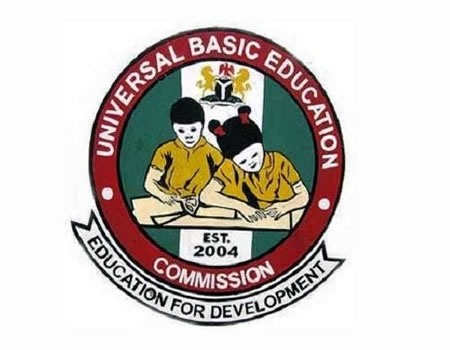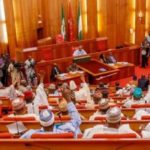The Universal Basic Education Commission has disclosed that it has disbursed more than 525 billion to the 36 states and Federal Capital Territory (FCT) as matching grants for the purpose of development of infrastructure in primary and junior secondary schools in their respective states.
The Commission also revealed that more than 27 million pupils are currently enrolled in both public and private primary schools across the country.
Deputy Executive Secretary of UBEC, Dr Isiaka Kolawole, made the disclosures on Tuesday in Abuja in his presentation during the visit of participants of the Senior Executive Course 44 of the National Institute for Policy and Strategic Studies, Kuru, Jos, to the Federal Ministry of Education.
The delegation was received by the Minister of Education, Malam Adamu Adamu, who was represented by the Acting Permanent Secretary, Mr David Gende.
The leader of the delegation, Professor Josephine Para-Mallam, said the focus participants of the Senior Executive Course 44 was Local Government Administration in Nigeria, and that the delegation was in the Ministry to find out the challenges being faced in education delivery as it affects Local Governments.
Kolawole in his presentation noted that the 1999 Constitution of the Federal Republic of Nigeria as amended empowered the Local Governments to provide primary school education in the country and that what the Federal Government does through UBEC is to provide intervention for quality basic education in the country.
He maintained that Local Government Areas across the country remain major actors and providers of primary education in Nigeria as enshrined in the Constitution.
He told the delegation that UBEC derives its financial strength from two per cent of the Consolidated Revenue Fund (CRF) of the Federal Government of Nigeria.
He also disclosed that the Commission has disbursed matching grants to 36 states of the Federation and FCT from 2005 to 2022 for the construction of classrooms and the development of other infrastructures in schools.
He said the Board instituted Nigeria Certificate in Education as the minimum entry qualification into the teaching profession at the basic education level to ensure the quality of teaching.
He further revealed that a total of 1.4 million teachers were trained from 2020 to 2018 in addition to capacity building of 774 Education Secretaries in Nigeria on effective implementation of the UBE programme.
On projects funded with matching grants from 2011 to 2022, Kolawole said new classrooms constructed stood 30,349, classrooms renovated 28, 212, VIP Toilets constructed 10,121 and 1,386 boreholes were also constructed within the period under review.
On school enrolment figures, he disclosed that a total of 22, 384,755 learners have enrolled in public primary schools in Nigeria, saying male learners constituted 52 per cent while female learners is 48 per cent.
In the same vein, the Deputy Executive Secretary disclosed that enrolment in private schools stands at 5, 054, 632 learners across the country.
The Minister of Education, Malam Adamu Adamu, earlier in his welcome address, said that in 2016, the Federal Ministry of Education under his watch instituted an integrated comprehensive strategic plan to issues and problems of education in Nigeria, as means of fulfilling the transformative campaign promises of President Mohammed Buhari on Education.
“This effort which culminated in Education for Change: A Ministerial Strategic Plan MSP (2016-2019) became a road map for educational emancipation of Nigeria. The MSP contains 10 pillars covering different aspects of education which must be improved on, to prepare Nigeria for the socio-economic competition of the 21st century,” he said.
He said the Institute has continued to live out the dreams of its founding fathers for its establishment by shaping and influencing Government policy making for national development.
He said: “The Institute’s theme for this year’s course “Strengthening Local Government in Nigeria Challenges, options and opportunities is coming at a very critical time when the existence of Local Governments in Nigeria has been attracting lots of concerns leaving a number of responsibilities under that tier unattended.
“Your effort at bringing the matter to the front burner, especially during this period of constitutional amendments is highly commendable and will surely assist in guiding the policy thrust of Government on the matter.
“The Local Government we all know is the 3rd tier of Government and Stands out as the government closest to the citizen. Its existence, therefore, imparts a great deal to the successful delivery of education at the foundation level.
“Unfortunately its current weak state has contributed to the unsuccessful delivery of a number of programmes aimed at bringing education closer to the child,” he said.
IN CASE YOU MISSED THESE FROM NIGERIAN TRIBUNE
- ‘Officials initially offered to help but when the number of able-bodied citizens at the centre increased, they left us unattended to’
- Why Ogun Tops List Of ‘Yahoo Boys’ In Nigeria ― Governor Abiodun
- Police, Amotekun after criminals on Lagos-Ibadan expressway
- Suspected cannibal pays N500,000 for boy’s human organs, says ‘that’s my favourite meal, especially the throat’
- Court awards Nnamdi Kanu N1 billion over invasion of his home by military, asks FG to apologise
WATCH TOP VIDEOS FROM NIGERIAN TRIBUNE TV
- Let’s Talk About SELF-AWARENESS
- Is Your Confidence Mistaken for Pride? Let’s talk about it
- Is Etiquette About Perfection…Or Just Not Being Rude?
- Top Psychologist Reveal 3 Signs You’re Struggling With Imposter Syndrome
- Do You Pick Up Work-Related Calls at Midnight or Never? Let’s Talk About Boundaries






